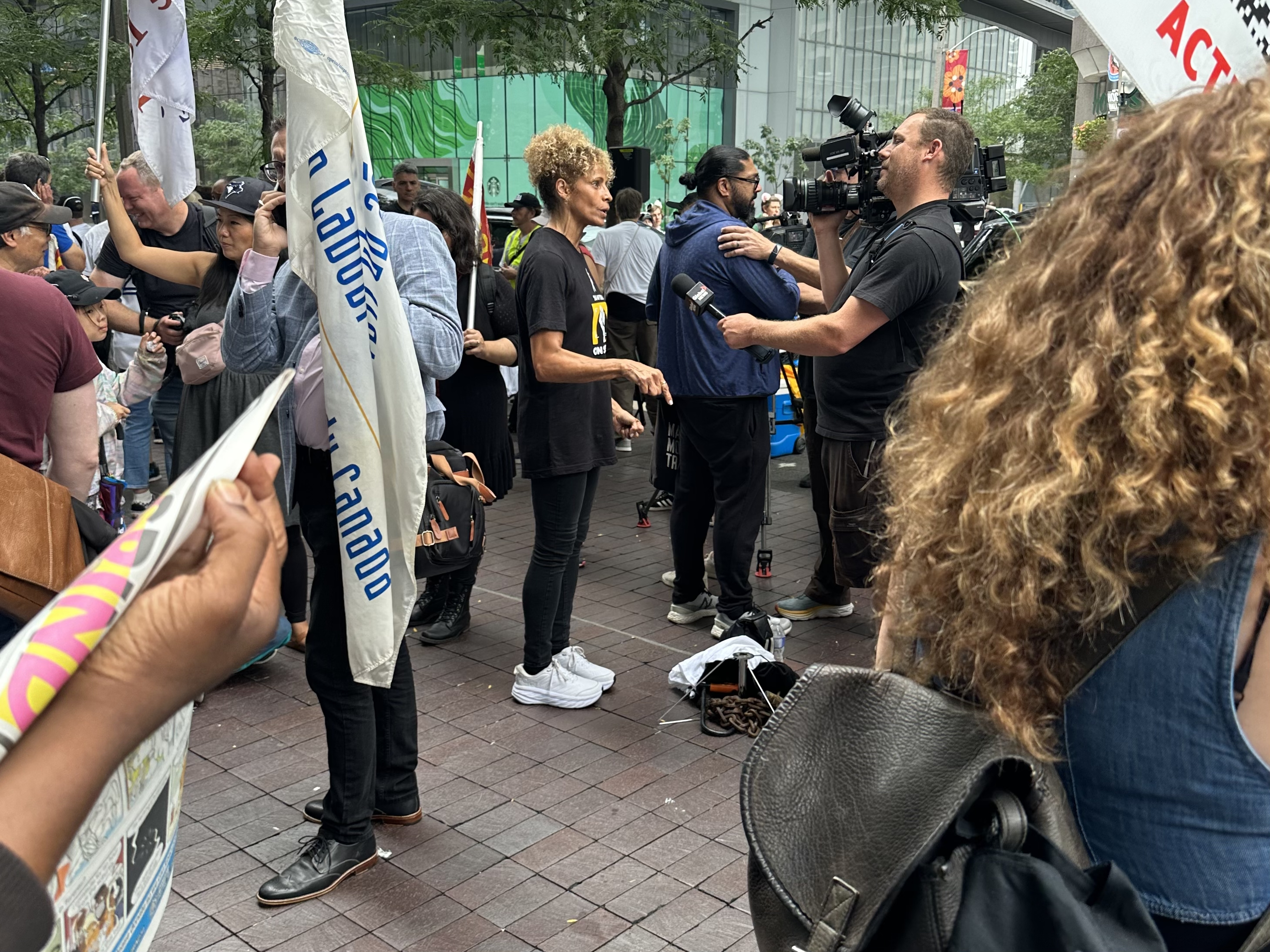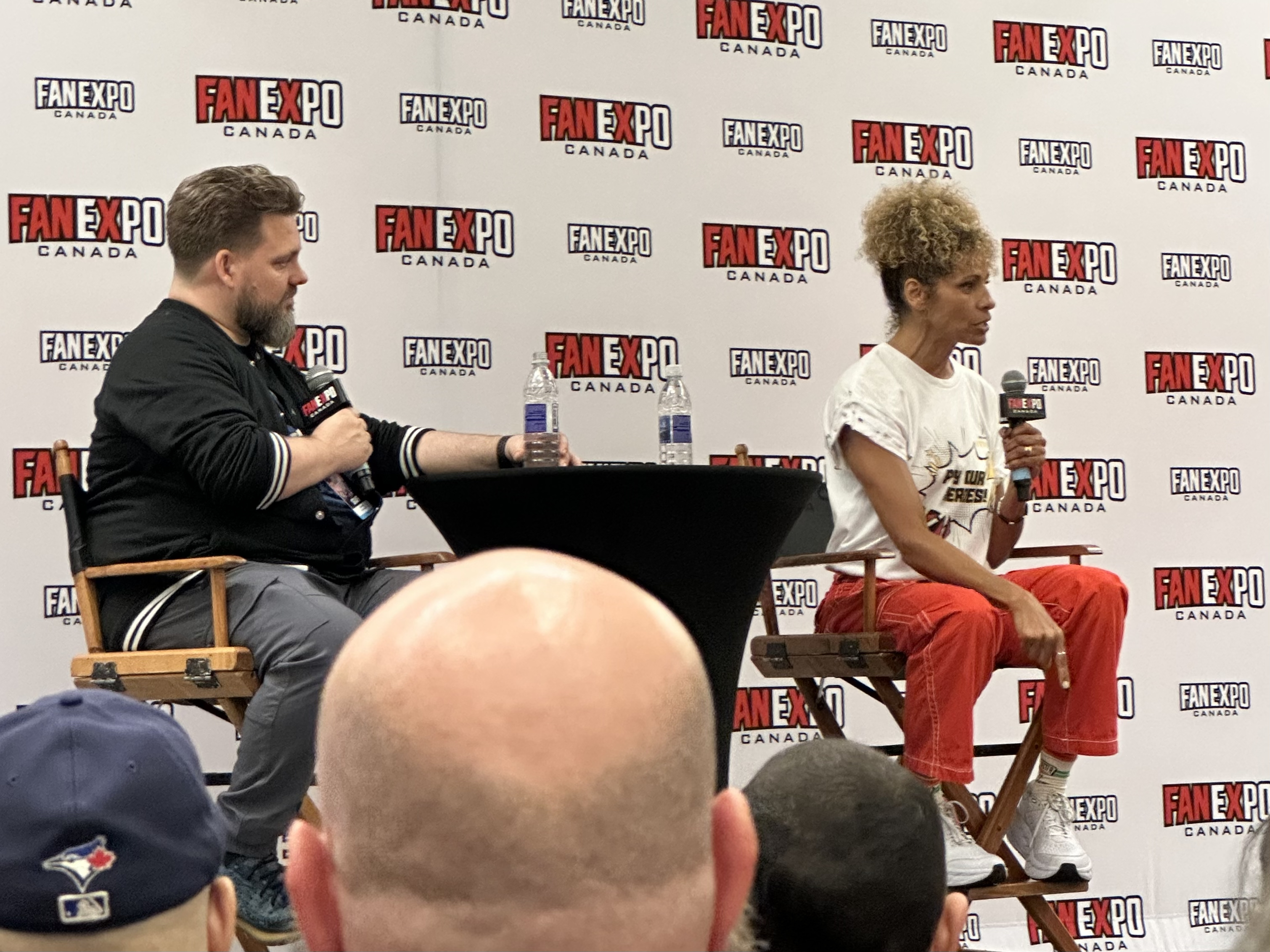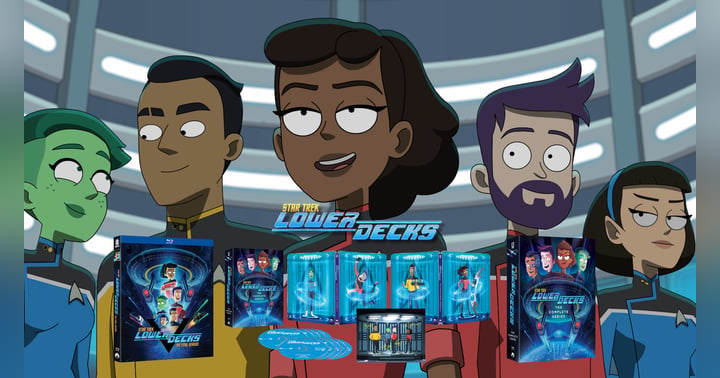Michelle Hurd Brings the Fight to Toronto

I'm not a member of SAG. I'm not a member of the WGA either. However, I have plenty of friends who are members of both of those unions. Some I made when I thought one day the stage or the screen might be my career, others through fandom, and most recently, having the privilege through this podcast to call some of the fine people who work on many of the series we all love friends.
Well past the 100-day mark, the WGA strike seems well on its way to surpassing the length of the 1998 strike. Meanwhile, the SAG-AFTRA strike also rages on, with both unions fighting for very similar reasons: the need for better working conditions, access to streaming numbers and better residual pay that, as of right now, amount to pennies on the dollar, and of course, much-needed regulation on the dangerous rise of AI in the industry.
At the heart of these strikes is SAG-AFTRA Vice President Michelle Hurd. Whether on the picket line, on the news, or doing interviews, you can't go very far without seeing her face or hearing her voice, fighting for what performers and writers deserve during this historic strike. Once again, she was at the forefront this weekend in Toronto, Canada.
In town for Toronton's big FAN EXPO Canada convention that Strange New Pod was lucky enough to attend, Michelle wasn't just there to sign autographs or take photo-ops. In fact, before she even entered FANEXPO on Friday, Hurd was out showing her solidarity with ACTRA (The Alliance of Canadian Cinema, Television and Radio Artists), who also are in the midst of their own grueling 16-month strike.
Michelle Hurd speaking to the media at the ACTRA Rally in Downtown Toronto
Erik, Emcee, and I were all proud to attend that rally and show our support outside Toronto's Amazon and Apple offices, where close to 300 members of ACTRA gathered.
Hurd's work did not stop at the ACTRA rally. On Saturday afternoon at FAN EXPO, hundreds of fans lined up for her 4 PM panel. It should be noted that it was Michelle Hurd who fought to have an amendment made in the strike rules, making it possible for the actors that we watch on our beloved shows to attend conventions and make the extra income some need to make ends meet while these strikes rage on.
I'm sure many of the fans who lined up to see Hurd on Saturday were there hoping to hear the actor tell some stories from her time working on "that one show in outerspace," as she so eloquently put it on Saturday. Instead, Hurd spent 60+ minutes talking about the strike. No, not talking, educating the room about why this strike is so critical.
It's an hour of my life that I won't forget any time soon. It was equal parts terrifying hearing just how greedy the studios are and equal parts inspirational hearing Michelle's passion and the fight that she continues to rage on behalf of her fellow performers.
"I'm a working-class actor," Hurd told the crowd Saturday afternoon. She would go on to explain that for many actors, even taking four to five roles a year isn't enough to cover the $26,000 minimum salary requirement for health insurance. Roughly 87% of SAG-AFTRA members don't meet that qualification, and as Hurd put it this past Saturday, "It's a hustle."
It didn't take long for AI to be brought up, either. Hurd spoke with fire and passion for every minute she was on that stage, but you can tell how frightened actors (and writers) are by how quickly AI has entered the conversation, and she spoke on the topic with urgency.
"It's not tomorrow; it's here today," Hurd said as she spoke on Artificial Intelligence. Actors are paid less than $200 for a day of work for many background gigs. Now, studios want to be able to scan those actors at the end of their day of work and use their likenesses whenever they please without any residual pay going to the performer. I don't need to explain why this is a massive problem.
And that's the perfect segway into maybe the most significant issue actors and writers are fighting for, and that is the absolute joke residual pay has become under the current deal. Michelle Hurd has been working on television for the better part of 30 years and mentioned how those checks used to mean something in the 90s.
But in this current era of streaming, something my co-host Matt and I have covered on numerous occasions on my other show, Everything is Permitted, residual checks have become a joke. As I mentioned above and as Michelle mentioned during her panel, residual checks come out to pennies on the dollars, with streaming studios claiming they don't have the technology to share their numbers. Spoilers: They do; they just don't want to open their books for their competition to see. "We never were shown finances from them," Hurd told the crowd at FAN EXPO.
What hit me the most during Michelle's panel was the amount of respect shown by the audience, which was a sharp contrast from the previous panel that featured Anson Mount and Ethan Peck. Fans in attendance wanted to be educated about what was happening. After hearing some side conversations after its conclusion, there was a real sense that folks witnessed something almost historic during those 60 minutes. Even during the panel, one convention goer went on the mic and proclaimed, "This talk right here? This is bitchin!"
Michelle Hurd spoke with a sense of urgency and passion for all 60 minutes of her panel
I certainly felt that way, and I know from how Hurd concluded the panel that may have been the intent. She stressed that she could feel that if a monumental deal is made, which is obviously the hope, it will be talked about in the decades to come; that these strikes were a real test of the people vs. corporate greed.
"This has to change now!" Hurd exclaimed near the end of her panel. Because if not, billionaires will become trillionaires, and everyone else, not just actors and writers, will be left behind.
By the time the panel ended, which was extended (and rightfully so), I was ready to join Michelle and my friends on the picket line. It's a moment I won't soon forget. Not everyone can go down and picket on a moment's notice, but if you would like to help and support the actors and writers who are currently striking for a better future, here are a few ways Hurd mentioned that you can help.
"Their bonuses equal $168 Million," Hurd says of studio executives at Netflix. One great way to help if you are not on the picket lines is to keep shaming the studios. You can also keep amplifying the message, as I hope this piece does. And finally, if you are able, you can donate to the Entertainment Community Fund.
















